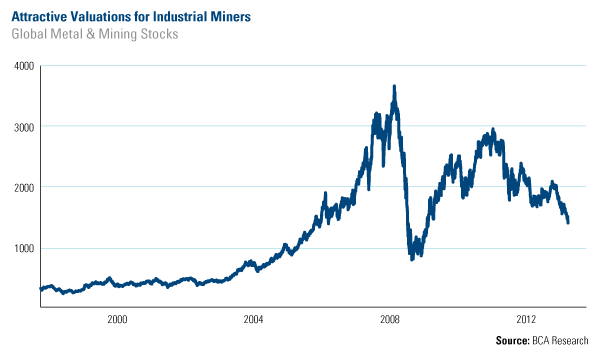Energy and Natural Resources Market Radar (July 1, 2013)
Strengths
- Data from China show that May’s total apparent oil demand grew 3.1 percent year-over-year and year-to-date oil demand is growing at 4.3 percent.
Weaknesses
- Benchmark Australian thermal coal prices fell below $80 per ton and broke through what the market had expected to be a floor, as thin Chinese demand and an oversupply of the fuel weighed on prices. Australia's Newcastle spot daily index dropped to $78.87 per ton on Thursday from $82.32 a week earlier, data from online trading platform globalCOAL showed.
- The average price of natural gas (NYMEX) prices fell 6 percent this week as weekly inventories in the U.S. continue to build at a higher rate than expected.
Opportunities
- In a report published earlier this week, Bank Credit Analyst made a bullish case for industrial mining stocks with a look back to the 1990s as a template for the cost savings miners will need to deliver to thrive as Chinese growth downshifts from double digits to 7-8 percent. The firm highlights the change in mining CEO mindsets, from growing production to containing costs, suggesting output cuts could occur swiftly and help provide support for metal prices. Additionally, further support for metal prices could emerge as the potential for unprofitable Chinese metal production declines as the new leadership pushes energy efficiency and market-based reforms.
Threats
- Bullion must rise to $1,500 an ounce for the gold mining industry to be sustainable, according to Gold Fields CEO Nick Holland. “The industry is not sustainable at $1,230 an ounce, which is where the gold price is at the moment,” Holland said. “We’re going to need at least $1,500 an ounce to sustain this industry in any reasonable form… There’s going to be significant rationalizing in the gold industry,” Holland said. “You can’t keep mines producing if they’re losing money,” he added.
- Anglo American’s new CEO, Mark Cutifani, said he fears a cash crunch in China will curb investment, hurting commodities demand, the Wall Street Journal reported, citing an interview with the executive. Cutifani said the fallout from Beijing squeezing the financial system as a warning to overenthusiastic lenders was a concern, the report stated. Cutifani said the policymakers needed to act swiftly to prevent a credit bubble.












